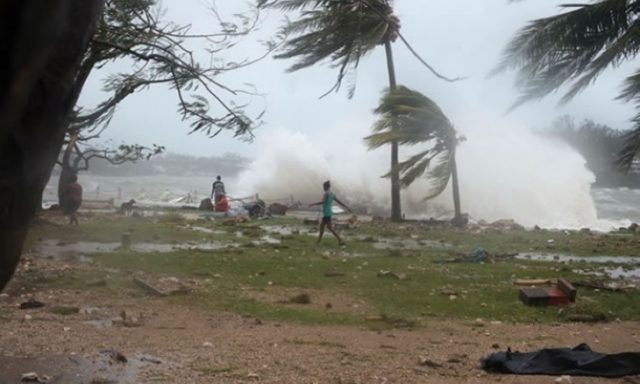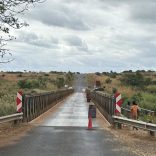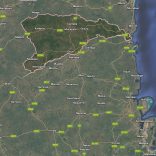Mozambique: Heavy vehicles banned from using the bridge over the Revué
Government decrees orange alert

Photo: Informemoz
The Mozambican government on Saturday decreed on orange alert, just one step down from the top of emergency readiness, a red alert, in response to the torrential rains and strong winds that have hit the northern province of Cabo Delgado since Wednesday.
The storms have killed at least five people and have made thousands homeless. Data given by Augusta Maita, the general director of the Mozambican relief agency, the National Disaster Management Institute (INGC), indicate that in the provincial capital, Pemba, 2,650 people have been directly affected by the storms, with 70 houses completely destroyed, and a further 458 damaged.
48 boats were damaged or destroyed, and 48 pylons were knocked down on the city’s low voltage electricity transmission lines.
In the neighbouring district of Metuge, eight houses were completely demolished by the storm, while in Ancuabe district, 11 houses were damaged or destroyed.
The storm also cut the province in half, by washing away a bridge over the Montepuez river. This has isolated the northern seven districts of Cabo Delgado from Pemba and the south of the province.
Although Cabo Delgado is the only province seriously affected so far, the weather forecast is that the storms will also hit Niassa, Nampula and Zambezia.
The government decreed the orange alert at an emergency meeting in Maputo of the INGC Coordinating Council, chaired by Prime Minister Carlos Agostinho do Rosario
After the meeting, the Minister of State Administration, Carmelita Namashalua, told reporters that the alert covers, no merely Cabo Delgado, but the entire country. This, she said, would help in positioning necessary goods for recue and relief purposes.
“Since this is the rainy season, it is important that the INGC should be prepared so that, if there is another situation similar to that in Cabo Delgado, the infrastructures are already in place for search and rescue operations”, she added.
At this time of year, Mozambique is prone to heavy rains and to cyclones, she pointed out. “Because of our geographical situation, we have to be prepared, and urge people to leave low lying areas near the river banks”, said Namashalua.












Leave a Reply
Be the First to Comment!
You must be logged in to post a comment.
You must be logged in to post a comment.